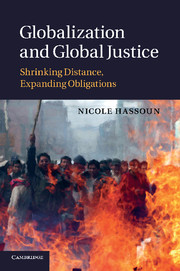
-
Select format
-
- Publisher:
- Cambridge University Press
- Publication date:
- 05 April 2012
- 22 March 2012
- ISBN:
- 9780511845802
- 9781107010307
- 9781107424920
- Dimensions:
- (228 x 152 mm)
- Weight & Pages:
- 0.5kg, 248 Pages
- Dimensions:
- (229 x 152 mm)
- Weight & Pages:
- 0.34kg, 248 Pages
You may already have access via personal or institutional login
Book description
The face of the world is changing. The past century has seen the incredible growth of international institutions. How does the fact that the world is becoming more interconnected change institutions' duties to people beyond borders? Does globalization alone engender any ethical obligations? In Globalization and Global Justice, Nicole Hassoun addresses these questions and advances a new argument for the conclusion that there are significant obligations to the global poor. First, she argues that there are many coercive international institutions and that these institutions must provide the means for their subjects to avoid severe poverty. Hassoun then considers the case for aid and trade, and concludes with a new proposal for fair trade in pharmaceuticals and biotechnology. Globalization and Global Justice will appeal to readers in philosophy, politics, economics and public policy.
Reviews
'Globalization and Global Justice provides concrete policy advice based on rigorous philosophical argument, relevantly blending empirical evidence with rich philosophical analysis. It explores theoretically informed, but practically focused proposals for how we can implement more justice in our actual, imperfect world. An excellent example of the contributions philosophers can make to important debates on matters of global justice.’
Gillian Brock - University of Auckland
‘Hassoun's analysis of international poverty is original, striking, and powerful; if she is right, then we have strong reasons to think that the world we have helped build is a very unjust place indeed. Her work should be read by anyone interested in how we ought to think about human rights in a globalizing world.’
Michael Blake - University of Washington
Contents
Metrics
Altmetric attention score
Full text views
Full text views help Loading metrics...
Loading metrics...
* Views captured on Cambridge Core between #date#. This data will be updated every 24 hours.
Usage data cannot currently be displayed.
Accessibility standard: Unknown
Why this information is here
This section outlines the accessibility features of this content - including support for screen readers, full keyboard navigation and high-contrast display options. This may not be relevant for you.
Accessibility Information
Accessibility compliance for the PDF of this book is currently unknown and may be updated in the future.


